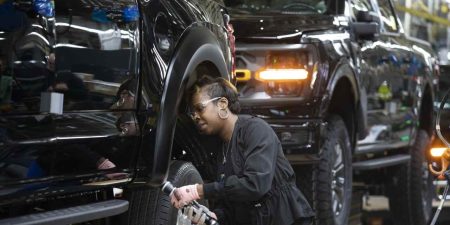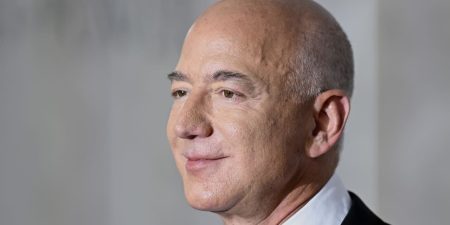You may not know who Ann Mather is, but you sure as heck know the companies where she’s worked.
Mather, 63, has been, and is, a top executive and/or board member at some of Silicon Valley and Hollywood’s most iconic names, including Alphabet (ticker: GOOG),
Netflix
(NFLX),
Airbnb
(ARNB), Disney (DIS), Pixar, and MGM, as well as
Bumble
(BMBL) where she is chair of the board of directors. Along the way she reported to and collaborated with the likes of Larry Page and Eric Schmidt, Reed Hastings, Brian Chesky, “Coach” Bill Campbell and Steve Jobs—making her a sort of media-tech Zelig.
As if that wasn’t singular enough, Mather (rhymes with Dan Rather), is British born and Cambridge educated and rose through the ranks first as an accountant and financial type, but is now called on for her strategic perspective.
Technology and media are complementary businesses of course. On the other hand, they’re also often at odds with each other. Mather has worked at the nexus of the two for decades, and so I asked her how she would describe that dynamic.
“I don’t think anyone can become complacent and think that they know what’s going to be happening,” she says. “It’s one of the things I love about [Netflix co-founder] Reed Hastings. He is super focused on Netflix, as are the current CEOs, Ted [Sarandis] and Greg [Peters], on what’s happening next, what the potential—threats is too strong a word—competition for eyeballs are.”
“I think it’s evolving organically. I think it will potentially affect our lives in a very positive way. I don’t think theaters are going to go away completely. I think it’s fascinating what Taylor Swift is doing. I could totally see [theaters] becoming more significant venues for live sports events, concerts, summaries of concert tours, like Taylor’s.”
I did the interview with Mather before word came out that Bumble was naming Lidiane Jones, currently CEO of Slack—owned by
Salesforce
(CRM)—to become its new CEO, succeeding Whitney Wolfe Herd, who becomes executive chairman. “We’re thrilled about Lidiane joining and also thrilled about Whitney in her new role as executive chairman,” Mather told me on Thursday, when I reached out to ask about the news. “Whitney was actually the person who found Lidiane.”
How will AI change platforms like Bumble?
“I think it gives everyone a fantastic opportunity to develop their own creative selves. In an app like Bumble, we’re super excited, as it allows us the potential to create a very personalized profile very easily. AI can find out just a little bit about you, and we can make it very easy with prompts. It can help select which photos are most likely to attract the right person. It’s going to be particularly relevant for men’s profiles, frankly. Too many with dead fish that don’t necessarily work well. “
Mather worked at Pixar (now owned by Disney) as CFO when
Apple
co-founder Steve Jobs was running the animation company. What was that like, I wondered?
“I loved it,” Mather said. “Frankly, no question Steve felt he added value by critiquing wherever he could. And I respect that. I don’t have a problem with someone who likes to look for as many holes as possible in situations. I think that is where much value is added to try to look for what could go wrong.”
“As CFO I was responsible largely for distribution as well. We were distributed by Disney at the time. There were many issues at that point in time. Disney was a different operation than it is now, and frankly, there were times when we really weren’t getting a fair deal.”
“We’d strategize together, but usually with Steve if I had something that I felt was important for Pixar to move forward with, I put all of my arguments…on a piece of paper and pre-anticipate what he would say, with the holes he would pick and put down some mitigating responses. [I would] usually email him right before dinner. He’d take six o’clock to eight o’clock every night to have dinner with his family. And then at eight o’clock, he’d call me. And we’d go through the list. And usually if I presented it properly, it was a very smooth and easy call. And we’d get done really quickly. If I tried to have a conversation explaining that, it was difficult, Steve’s so fast in the way he responds and the things he thinks of, it can be challenging to get back as quickly as he is getting back to you. So there was a way of working with Steve that I personally loved.”
It makes you wonder what Jobs would make of today’s tech/media landscape, and how he would play it.
Write to Andy Serwer at [email protected]
Read the full article here















